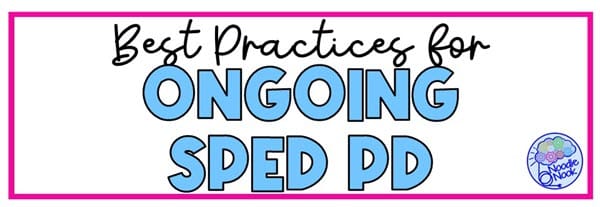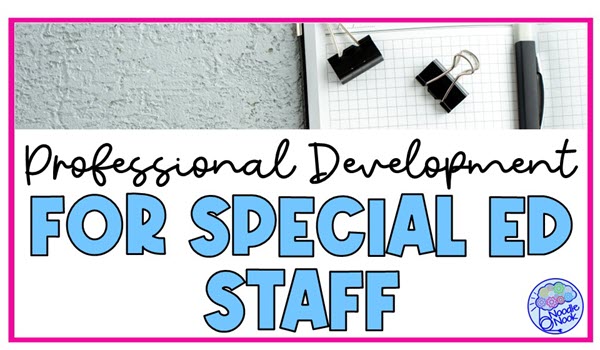Ongoing professional development for special education staff is an important way to ensure that educators have the knowledge, skills, and resources they need to effectively support students with disabilities.
Professional development for special education staff can help them stay up to date on best practices, research, and technology, and can provide opportunities for collaboration and networking with colleagues.
Why is Ongoing Professional Development for Special Education Staff Important?
Ongoing professional development for special education staff is important for a number of reasons:
To stay up to date on best practices and research:
The field of special education is constantly evolving, with new research and best practices being developed all the time. Ongoing professional development for special education staff helps them stay current on the latest research and best practices, and ensures that they are using evidence-based approaches to support the learning and development of students with disabilities.
To learn new strategies and techniques:
Professional development can provide special education staff with the opportunity to learn new strategies and techniques for supporting the learning and development of students with disabilities. This might include learning about new technologies or approaches to teaching, or learning about different methods for assessing and evaluating student progress.
To improve effectiveness:
Ongoing professional development can help special education staff improve their effectiveness in their roles by providing them with the knowledge, skills, and resources they need to better support the learning and development of students with disabilities.
To support student outcomes:
By staying up to date on best practices and research, and learning new strategies and techniques, special education staff can more effectively support the learning and development of students with disabilities. This can help improve student outcomes and ensure that students with disabilities have the same opportunities to succeed as their non-disabled peers.
Ongoing professional development is crucial in special education because it helps educators stay current on the latest research, techniques, and technologies related to supporting students with disabilities. By participating in professional development opportunities, special education staff can improve their effectiveness, increase their knowledge and skills, and better support the learning and development of their students.
Ultimately, this can lead to improved student outcomes and help ensure that students with disabilities have equal opportunities for success.
Be sure to check out the session available through Noodle Nook here.
Best Practices for Planning Special Ed PD
Planning special education professional development (PD) is an important part of an administrator’s job. It’s how to ensure staff has the knowledge, skills, and resources they need to effectively support students with disabilities. Effective special education PD should be tailored to the needs and goals of the staff and the students and should be based on best practices and research.
Here are a few successful techniques to provide ongoing professional development for special education staff:
Identify areas for growth and improvement:
The first step in developing a professional development plan is to identify areas for growth and improvement. This might involve conducting a needs assessment to determine the knowledge, skills, and resources that special education staff need to be more effective in their roles.
Set specific, measurable goals:
Once areas for growth and improvement have been identified, the next step is to set specific, measurable goals that will help special education staff achieve those objectives. These goals should be aligned with the needs and goals of the students and should be based on best practices and research.
Choose relevant and high-quality professional development opportunities:
There are many different types of opportunities for professional development for special education staff, including conferences, workshops, online courses, and webinars. It is important to choose opportunities that are relevant to the needs and goals of the staff and the students, and that are of high quality.
Provide ongoing support and resources:
Professional development is an ongoing process, and it is important to provide ongoing support and resources to help special education staff implement what they have learned. This might involve providing access to resources and materials, offering coaching or mentoring, or providing opportunities for ongoing learning and collaboration.
No matter how you choose to approach it, teacher training isn’t something you do in August before the students arrive, and then never do it again. Ongoing is the key word here.
Resources to Support Professional Development in Special Ed
Are you looking for resources to support your professional development in special education?
Look no further!
In this section, we’ll explore some of the top resources available to help you stay up to date on best practices, research, and technology, and to provide opportunities for collaboration and networking with colleagues.
Whether you’re a Sped administrator, seasoned special education veteran or new to the field, there are resources out there to support your professional development and help you grow in your career. Let’s take a look at some of the top resources available to support professional development in special education.
Professional organizations:
Professional organizations, such as the Council for Exceptional Children (CEC) and the International Association of Special Education (IASE), offer a range of professional development opportunities for special education staff, including conferences, workshops, online courses, and webinars.
State departments of education:
Many state departments of education offer professional development resources and opportunities specifically for special education staff, including training, workshops, and online courses.
Universities and colleges:
Local universities and colleges offer professional development opportunities for special education staff, including degree and certification programs, workshops, and conferences.
Online learning platforms:
There are many online learning platforms that offer a range of professional development courses and programs. If you’re an administrator looking specifically for special education training for your entire department or school, check out the catalog available from Noodle Nook and Responsive Learning.
Professional development providers:
There are many professional development providers that offer specialized training and resources for special education staff, including consultants, coaching and mentoring services, and training organizations. Click HERE to see what’s happening with your favorite special education presenter, Ayo Jones.
Overall, there are many resources available for ongoing professional development for special education staff, including professional organizations, state departments of education, universities and colleges, online learning platforms, and professional development providers. It is important to choose high-quality, relevant professional development opportunities that align with the needs and goals of the staff and the students.
Most important Topics for Special Ed Staff
If you’re not sure where to start with professional development topics for your special education staff, here are a few critical categories where all staff should have a solid knowledge base and ongoing development.
Evidence-based practices:
It is important for special education teachers to stay up to date on the latest research and best practices in the field, and to use evidence-based practices to support the learning and development of students with disabilities.
Differentiated instruction:
Special education teachers often work with students who have a wide range of abilities and needs, and it is important for them to be able to adapt their instruction to meet the needs of each student. Professional development in differentiated instruction can help teachers learn strategies and techniques for tailoring instruction to the needs of individual students.
Universal design for learning (UDL):
UDL is an approach to teaching that aims to make instruction accessible and effective for all learners, regardless of ability. Professional development in UDL can help special education teachers learn how to design and deliver instruction that is inclusive and flexible, and that meets the needs of a wide range of learners.
Assistive technology:
Assistive technology can be a powerful tool for supporting the learning and development of students with disabilities, and special education teachers should be familiar with a range of assistive technology options. Professional development in assistive technology can help teachers learn how to effectively use and integrate assistive technology into their instruction.
Collaboration and communication:
Special education teachers often work closely with other educators, as well as with parents and guardians, to support the learning and development of students with disabilities. Professional development in collaboration and communication can help teachers learn effective strategies for working with others to support student learning.
Overall, there are many important professional development topics for special education teachers, including evidence-based practices, differentiated instruction, universal design for learning, assistive technology, and collaboration and communication.
Recap: Professional Development for SpEd Staff
Ongoing professional development for special education staff is critically important. Keeping your team up to date on best practices, improving their efficacy, and helping them learn the strategies and techniques to use in the classroom directly impacts student outcomes.
To help make sure your staff PD is hitting the mark and meaningful, remember some best practices. Those include identifying areas for growth and improvement, setting specific and measurable goals, choosing relevant topics, and providing support.
You can access the resources you need to do this by accessing professional organizations, your state’s department of education, online learning platforms, and individual professional development providers.
Doing this will improve outcomes for your students, help retain more teachers who are better qualified to support students, and help your special ed team be the best they can be.


